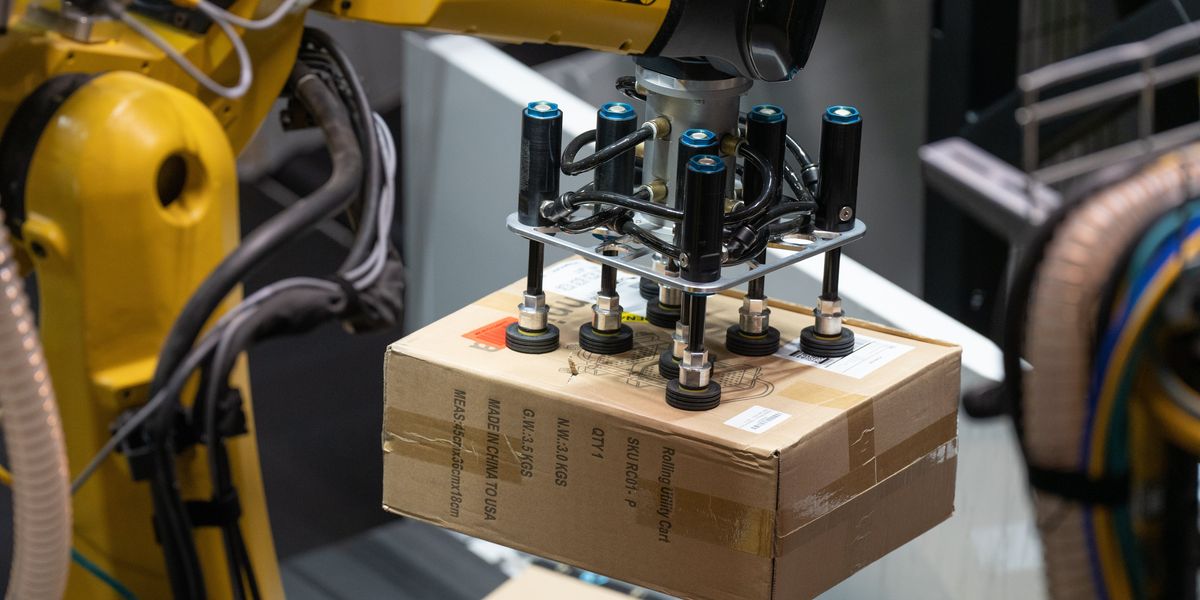It is a sponsored article dropped at you by Amazon.
The slicing fringe of robotics and synthetic intelligence (AI) doesn’t happen simply at NASA, or one of many high college labs, however as an alternative is more and more being developed within the warehouses of the e-commerce firm Amazon. As on-line buying continues to develop, firms like Amazon are pushing the boundaries of those applied sciences to satisfy shopper expectations.
Warehouses, the spine of the worldwide provide chain, are present process a change pushed by technological innovation. Amazon, on the forefront of this revolution, is leveraging robotics and AI to form the warehouses of the long run. Removed from being only a logistics group, Amazon is positioning itself as a pacesetter in technological innovation, making it a chief vacation spot for engineers and scientists in search of to form the way forward for automation.
Amazon: A Chief in Technological Innovation
Amazon’s success in e-commerce is constructed on a basis of steady technological innovation. Its achievement facilities are more and more changing into hubs of cutting-edge know-how the place robotics and AI play a pivotal function. Heath Ruder, Director of Product Administration at Amazon, explains how Amazon’s strategy to integrating robotics with superior materials dealing with tools is shaping the way forward for its warehouses.
“We’re integrating a number of large-scale merchandise into our next-generation achievement heart in Shreveport, Louisiana,” says Ruder. “It’s our first alternative to get our robotics methods mixed underneath one roof and perceive the end-to-end mechanics of how a constructing can run with integrated autonomation.” Ruder is referring to the power’s deployment of its Automated Storage and Retrieval Techniques (ASRS), referred to as Sequoia, in addition to robotic arms like “Robin” and “Cardinal” and Amazon’s proprietary autonomous cell robotic, “Proteus”.
Amazon has already deployed “Robin”, a robotic arm that types packages for outbound transport by transferring packages from conveyors to cell robots. This technique is already in use throughout varied Amazon achievement facilities and has accomplished over three billion profitable bundle strikes. “Cardinal” is one other robotic arm system that effectively packs packages into carts earlier than the carts are loaded onto supply vans.
“Proteus” is Amazon’s autonomous cell robotic designed to work round folks. Not like conventional robots confined to a restricted space, Proteus is totally autonomous and navigates by means of achievement facilities utilizing sensors and a mixture of AI-based and ML methods. It really works with human staff and different robots to move carts stuffed with packages extra effectively.
The mixing of those applied sciences is estimated to extend operational effectivity by 25 %. “Our purpose is to enhance velocity, high quality, and price. The effectivity positive factors we’re seeing from these methods are substantial,” says Ruder. Nonetheless, the true problem is scaling this know-how throughout Amazon’s world community of achievement facilities. “Shreveport was our testing floor and we’re enthusiastic about what we have now discovered and can apply at our subsequent constructing launching in 2025.”
Amazon’s funding in cutting-edge robotics and AI methods is not only about operational effectivity. It underscores the corporate’s dedication to being a pacesetter in technological innovation and office security, making it a high vacation spot for engineers and scientists seeking to remedy advanced, real-world issues.
How AI Fashions Are Educated: Studying from the Actual World
Probably the most advanced challenges Amazon’s robotics staff faces is methods to make robots able to dealing with all kinds of duties that require discernment. Mike Wolf, a principal scientist at Amazon Robotics, performs a key function in creating AI fashions that allow robots to raised manipulate objects, throughout an almost infinite number of eventualities.
“The complexity of Amazon’s product catalog—a whole bunch of tens of millions of distinctive gadgets—calls for superior AI methods that may make real-time selections about object dealing with,” explains Wolf. However how do these AI methods be taught to deal with such an immense number of objects? Wolf’s staff is creating machine studying algorithms that allow robots to be taught from expertise.
“We’re creating the following era of AI and robotics. For anybody on this area, Amazon is the place the place you may make a distinction on a world scale.” —Mike Wolf, Amazon Robotics
Actually, robots at Amazon constantly collect knowledge from their interactions with objects, refining their capability to foretell how gadgets will probably be affected when manipulated. Each interplay a robotic has—whether or not it’s choosing up a bundle or inserting it right into a container—feeds again into the system, refining the AI mannequin and serving to the robotic to enhance. “AI is regularly studying from failure instances,” says Wolf. “Each time a robotic fails to finish a activity efficiently, that’s really a chance for the system to be taught and enhance.” This data-centric strategy helps the event of state-of-the-art AI methods that may carry out more and more advanced duties, equivalent to predicting how objects are affected when manipulated. This predictive capability will assist robots decide one of the simplest ways to pack irregularly formed objects into containers or deal with fragile gadgets with out damaging them.
“We would like AI that understands the physics of the atmosphere, not simply fundamental object recognition. The purpose is to foretell how objects will transfer and work together with each other in actual time,” Wolf says.
Valerie Samzun, Senior Technical Product Supervisor at Amazon, leads a cutting-edge robotics program that goals to boost office security and make jobs extra rewarding, fulfilling, and intellectually stimulating by permitting robots to deal with repetitive duties.
“The purpose is to cut back sure repetitive and bodily demanding duties from associates,” explains Samzun. “This enables them to give attention to higher-value duties in expert roles.” This shift not solely makes warehouse operations extra environment friendly but in addition opens up new alternatives for staff to advance their careers by creating new technical expertise.
“Our analysis combines a number of cutting-edge applied sciences,” Samzun shared. “The venture makes use of robotic arms outfitted with compliant manipulation instruments to detect the quantity of pressure wanted to maneuver gadgets with out damaging them or different gadgets.” That is an development that comes with learnings from earlier Amazon robotics initiatives. “This strategy permits our robots to know methods to work together with completely different objects in a manner that’s secure and environment friendly,” says Samzun. Along with robotic manipulation, the venture depends closely on AI-driven algorithms that decide one of the simplest ways to deal with gadgets and make the most of area.
Samzun believes the know-how will finally broaden to different components of Amazon’s operations, discovering a number of functions throughout its huge community. “The potential functions for compliant manipulation are big,” she says.
Attracting Engineers and Scientists: Why Amazon is the Place to Be
As Amazon continues to push the boundaries of what’s attainable with robotics and AI, it’s additionally changing into a extremely enticing vacation spot for engineers, scientists, and technical professionals. Each Wolf and Samzun emphasize the distinctive alternatives Amazon provides to these curious about fixing real-world issues at scale.
For Wolf, who transitioned to Amazon from NASA’s Jet Propulsion Laboratory, the enchantment lies within the sheer affect of the work. “The draw of Amazon is the power to see your work deployed at scale. There’s no different place on this planet the place you possibly can see your robotics work making a direct affect on tens of millions of individuals’s lives day by day,” he says. Wolf additionally highlights the collaborative nature of Amazon’s technical groups. Whether or not engaged on AI algorithms or robotic {hardware}, scientists and engineers at Amazon are always collaborating to resolve new challenges.
Amazon’s tradition of innovation extends past simply know-how. It’s additionally about empowering folks. Samzun, who comes from a non-engineering background, factors out that Amazon is a spot the place anybody with the appropriate mindset can thrive, no matter their educational background. “I got here from a enterprise administration background and located myself main a robotics venture,” she says. “Amazon gives the platform so that you can develop, be taught new expertise, and work on a number of the most fun initiatives on this planet.”
For younger engineers and scientists, Amazon provides a novel alternative to work on state-of-the-art know-how that has real-world affect. “We’re creating the following era of AI and robotics,” says Wolf. “For anybody on this area, Amazon is the place the place you may make a distinction on a world scale.”
The Way forward for Warehousing: A Fusion of Expertise and Expertise
From Amazon’s management, it’s clear that the way forward for warehousing is about extra than simply automation. It’s about harnessing the facility of robotics and AI to create smarter, extra environment friendly, and safer working environments. However at its core it stays centered on folks in its operations and those that make this know-how attainable—engineers, scientists, and technical professionals who’re pushed to resolve a number of the world’s most advanced issues.
Amazon’s dedication to innovation, mixed with its huge operational scale, makes it a pacesetter in warehouse automation. The corporate’s give attention to integrating robotics, AI, and human collaboration is reworking how items are processed, saved, and delivered. And with so many progressive initiatives underway, the way forward for Amazon’s warehouses is one the place know-how and human ingenuity work hand in hand.
“We’re constructing methods that push the bounds of robotics and AI,” says Wolf. “If you wish to work on the innovative, that is the place to be.”
From Your Web site Articles
Associated Articles Across the Internet





